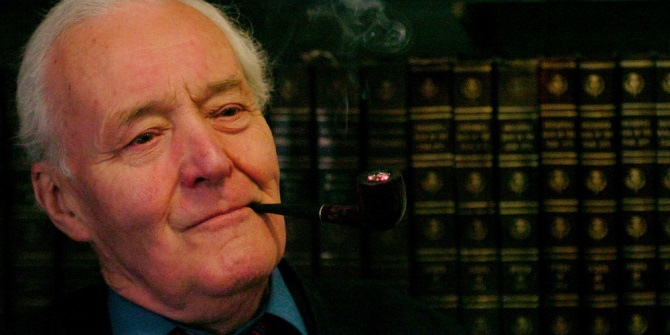 The decline in political party membership in the UK is a recipe for a crisis of legitimacy. The parties continue as the monopolists of access to political careers and to political office, but in a context in which 99 per cent of citizens now do not belong to a political party. Parties can re-invent themselves and open up, or we need to recognise that the age of the mass party is simply over and that new structures of representation and participation have to be embraced instead. Tony Wright argues, however, that it is perfectly possible for parties to continue to structure political life and offer accountable political choice without also being the monopolists of political power.
The decline in political party membership in the UK is a recipe for a crisis of legitimacy. The parties continue as the monopolists of access to political careers and to political office, but in a context in which 99 per cent of citizens now do not belong to a political party. Parties can re-invent themselves and open up, or we need to recognise that the age of the mass party is simply over and that new structures of representation and participation have to be embraced instead. Tony Wright argues, however, that it is perfectly possible for parties to continue to structure political life and offer accountable political choice without also being the monopolists of political power.
One of the central facts of recent British politics has been the decline of the political party. Fewer people are voting for them, memberships have collapsed, and strength of attachment has fallen away. The only party currently prospering, UKIP, is doing so because it has successfully exploited the prevailing ‘none of the above’ sentiment. Why has this decline happened? Does it matter? And what, if anything, might be done about it?
It is easier to see why it has happened than it is to frame a coherent response. The great motors of the modern party system—class and ideology—have ceased to function in the way they once did. For much of the twentieth century, politics in Britain was organised on the basis of a struggle between socialism and anti-socialism (however defined) and this structured the two-party dominance of the post-1945 world. That era has now ended, and with it the leading role of the main protagonists. If politics is conducted on broadly similar terrain then it is inevitable that much of the old motive power that fuelled party adherence is diminished. For some, new passions fill the gap (getting Britain out of the EU, getting Scotland out of Britain), but for most there is a turning away from party politics of the traditional kind.
The result is a problem of party funding, as big donors displace mass memberships; but even more crucially a problem of representation, as party politicians increasingly become a political class without a popular base. This in turn nourishes varieties of anti-politics (or non-politics). The parties continue as the monopolists of access to political careers and to political office, but in a context in which 99 per cent of citizens now do not belong to a political party. This is a recipe for a crisis of legitimacy.
There are two sorts of responses to this decline of party, both coherent but pointing in different directions. The first response is to try to ‘reinvent’ parties by making them looser, opening them up, reducing barriers to participation and generally making them more attractive. Ed Miliband’s recent initiative in relation to trade unionists is an example of this approach, as is the introduction of primary elections for the selection of candidates (much touted after the parliamentary expenses scandal but neglected since). So far this approach has not had much success and has its own difficulties (not least the fact that if party membership does not bring the exclusive right to select candidates then this might further depress any incentive to join). However this reinvention approach is certainly worth pursuing if parties want to show that they are at least trying to respond to the diminished position in which they find themselves.
The second sort of response is sharply different. This is to recognise that the age of the mass party is simply over and that new structures of representation and participation have to be embraced instead. The task is not to reinvent parties but to replace them. This means accepting that politics is now the preserve of a professional political class, but surrounding it with a dense network of scrutiny, transparency and accountability from a whole variety of groups and organisations. It might also mean developing mechanisms of direct democracy such as the referendum to by-pass the representational hold of the moribund political parties. On this view parties are part of an old model of politics that now needs replacing.
This second approach has analytical merit, but it also glides over the central function that political parties have in organising political choice in a reasonably coherent way (which is why they are ubiquitous in political systems) and in enabling political power to be held to account. They may be imperfect in all kind of ways, but the role they perform is nevertheless fundamental. We should therefore be careful about waving them goodbye. The decline of party will only be beneficial to those sources of private power that want to escape from the disciplines of political accountability. It is clearly necessary to take up the representational and participatory slack that party decline has produced, and to do so in new and innovative ways, but this does not mean that parties have ceased to matter.
Where does all this leave us? It means combining a recognition of the continued centrality of party for democratic politics with a further recognition that the decline of party brings implications for the conduct of politics. It might suggest a certain modesty of approach on the part of party leaders aware of their diminished following. More important still, it involves an acceptance that while party necessarily structures political life this does not mean that it should dominate it. In all sorts of ways party should press less heavily than it currently does, not least because the monopoly of party on public life excludes the vast majority of citizens from effective participation. There should be more spaces where the party writ does not run, or runs less completely.
This is the case for opening up party selections to a wider electorate, with a wider spread of candidates and where party service is not the main requirement. Political recruitment is too important to be left to the often tiny (and doubtfully representative) group of party activists who now make up what is left of many constituency parties. One of the disappointments of the new police commissioner elections was their failure to bring forward good candidates beyond the familiar party faces. So too with the slow progress towards elected city mayors, where the prospective candidacy of significant local figures outside the party machines failed to materialise and thus helped to kill off any enthusiasm for the idea.
It is perfectly possible for parties to continue to structure political life and offer accountable political choice without also being the monopolists of political power. This means having more spaces where party presses more lightly; but it also provides the justification for more public interest regulation around the activities of parties. Parties have to learn to share power; but those who want to bury parties need to learn why it is important to keep them alive.
This article was originally published on the Political Quarterly Editor’s blog.
Note: This article gives the views of the author, and not the position of the British Politics and Policy blog, nor of the London School of Economics. Please read our comments policy before posting.
 Tony Wright joined UCL as Visiting Professor of Government and Public Policy after retiring from the House of Commons at the 2010 general election. As a Member of Parliament he chaired the Select Committee on Public Administration for over a decade. He also chaired the Select Committee on Reform of the House of Commons – referred to as the ‘Wright Committee’ – which secured major reforms to the way in which the Commons works, in the wake of the parliamentary expenses scandal.
Tony Wright joined UCL as Visiting Professor of Government and Public Policy after retiring from the House of Commons at the 2010 general election. As a Member of Parliament he chaired the Select Committee on Public Administration for over a decade. He also chaired the Select Committee on Reform of the House of Commons – referred to as the ‘Wright Committee’ – which secured major reforms to the way in which the Commons works, in the wake of the parliamentary expenses scandal.








This while today’s announcement that Labour gained 100k members in the past month? OK! I mean, political parties responsiveness to its constituents is a different conversation, but to postulate the death of political parties, well, that’s a different story.
The basis of political parties to represent interest groups and ideology is broad coalition of interests in an archestarted programmes of action if it’s party comes to political power to legislate.
Has the basis for the political parties dwindled?
Yes surely the after some of the basic issues connected to freedoms on the basis of national,religious and linguistic and even racial combined with other factors have broadly been achieved though it’s echoes are are still raging in many parts of world as unfinished goals.
The economic basis of idealogy found in Marxism, fascism,reagonism and that thatcher ism etc have become outdated and anachronistic after great strides made in science and tecknology led globalisation in all its various shades.
The traditional political parties and loyalties to their ideas have correspondingly dwindling all over advanced democracies.
The author therefore right right in his observations.but the essential element for the existence of political party to elicit the general will of the people through election process has not changed and after general elections people are concerned on focusing on specific issue based interests and moving around the same perhaps NGO s as pressure groups to represent their voices in law making processes apart from elected representatives.this phenomena is occurring. It cannot be said that people have become less interested in democratic process and courts are also being used to straitened the political parties from deviant behaviour.
The future trend perhaps will be merger of several international NGOS like in climate issue and global peace and prosperity and as common platform in political action and even party lines cut across national borders to reflect common global issues and action and some new ideological germination may take when new revival of interest takes place on party lines.
The ups and downs and swings in ides and ideology may cane with rising issues either due to economic developments like inflation,deflation,growth and down turn so also with defence and security on nation or global concerns or in permutation and combination some such issues but the general uptrend is down turn of traditional national political parties and likely germination of international and global political action groups as parties for global issues and common interests and corresponding global political,economic order.
Across the sea in America we are viewing on a much more expensive and debilitating basis the rising of an elected political class, with safe seats in the legislature becoming more numerous with re-districting by the majority party in each state.
To that has been added what I call a permanent floating bureaucracy. This involves careerists moving up the ladders and across the bridges. From member staffs, to subcommittee aides, to employment in the executive branch in the numerous agencies, and moving further up — never in danger of being unable to pay the mortgage. Evenings are spent in graduate courses — law degrees are preferred. The best and the brightest go on to the over-numerous think tanks, to bridge into senior executive positions within the government. Others move to lobbying firms, rolodex at the ready.
Military and elected officials may be transferred out or lose elections. The super cadre remain. Bread and circuses are provided to the public
The most important objective for the elected is re-election and frightfully costly it is. For members of both parties the operative phrase is “Keep the voters sleeping.”